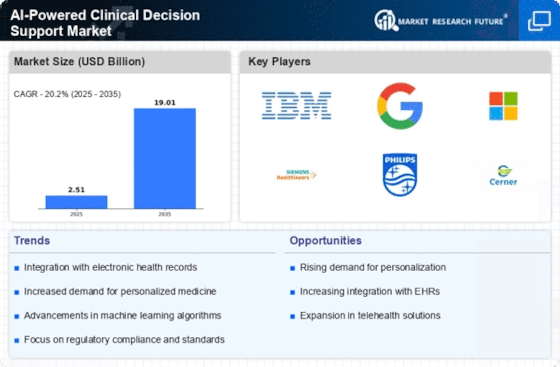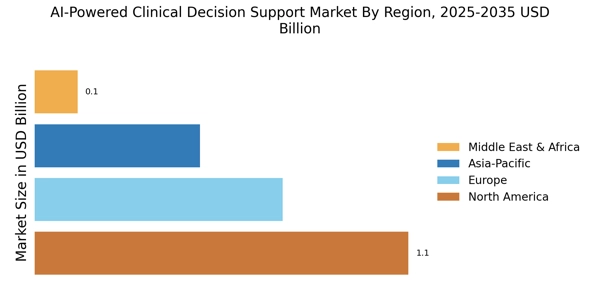Regulatory Support for AI Integration
Regulatory support is emerging as a significant driver for the AI-Powered Clinical Decision Support Market. Governments and regulatory bodies are increasingly recognizing the potential of AI technologies to improve healthcare delivery. Initiatives aimed at establishing frameworks for the safe and effective integration of AI into clinical practice are gaining momentum. This regulatory backing not only fosters innovation but also instills confidence among healthcare providers regarding the adoption of AI solutions. As a result, the AI-Powered Clinical Decision Support Market is likely to experience accelerated growth, as regulatory clarity encourages investment and development in AI technologies.
Rising Demand for Personalized Medicine
The AI-Powered Clinical Decision Support Market is experiencing a notable surge in demand for personalized medicine. This trend is driven by the increasing recognition of the need for tailored treatment plans that cater to individual patient characteristics. As healthcare providers seek to enhance patient outcomes, AI-powered solutions are being integrated to analyze vast datasets, including genetic information and lifestyle factors. This integration allows for more precise treatment recommendations, thereby improving the efficacy of interventions. According to recent estimates, the market for personalized medicine is projected to reach substantial figures, indicating a robust growth trajectory. Consequently, the AI-Powered Clinical Decision Support Market is poised to benefit significantly from this shift towards personalized healthcare.
Increased Focus on Healthcare Efficiency
The AI-Powered Clinical Decision Support Market is significantly influenced by the heightened focus on healthcare efficiency. As healthcare systems grapple with rising costs and resource constraints, there is a pressing need for solutions that streamline operations and enhance patient care. AI-powered clinical decision support tools are being adopted to optimize workflows, reduce diagnostic errors, and improve clinical outcomes. Reports suggest that implementing these technologies can lead to substantial cost savings and improved patient satisfaction. Consequently, healthcare organizations are increasingly investing in AI solutions, which is likely to propel the growth of the AI-Powered Clinical Decision Support Market in the foreseeable future.
Advancements in Machine Learning Algorithms
The evolution of machine learning algorithms is a pivotal driver for the AI-Powered Clinical Decision Support Market. These advancements enable more sophisticated data analysis, allowing healthcare professionals to derive actionable insights from complex datasets. Enhanced algorithms facilitate improved diagnostic accuracy and treatment recommendations, which are crucial in clinical settings. As machine learning continues to evolve, its applications in predictive analytics and risk stratification are becoming increasingly prevalent. This trend is reflected in the growing investment in AI technologies, with projections indicating that the market could expand significantly in the coming years. Thus, the AI-Powered Clinical Decision Support Market stands to gain from these technological innovations.
Growing Emphasis on Data-Driven Decision Making
The shift towards data-driven decision making is a critical factor propelling the AI-Powered Clinical Decision Support Market. Healthcare providers are increasingly recognizing the value of leveraging data analytics to inform clinical decisions. By utilizing AI-powered tools, clinicians can access real-time data and evidence-based guidelines, which enhances the quality of care delivered to patients. This trend is underscored by the increasing availability of electronic health records and other data sources, which facilitate comprehensive analysis. As healthcare organizations prioritize data-driven strategies, the demand for AI-powered clinical decision support systems is expected to rise, thereby fostering growth within the market.

















